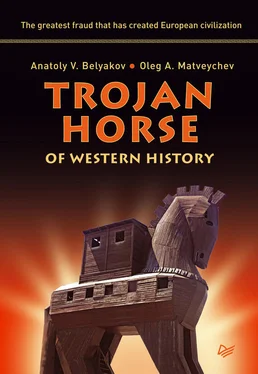For Homer’s contemporaries, the style of the Iliad and the Odyssey sounded as peculiar as the style of Gnedich is for us. It combines the dialectical features of the Aeolian language and that of the Ionic Greeks, who, by the 10th century B.C., began to colonize the Aegean Region and the North-Western part of the Anatolian coast, and the archaisms of rhapsodies of the Mycenaean epoch, poetic tradition of which reached Homer from the distant past. “That language was clear to listeners, who, since childhood, were used to the songs of Homeric bards – the creators and performers of Greek epos – although, in real life, nobody spoke that language. The unusual language emphasized the singularity of the events described and helped listeners to get transferred to the world of the heroic past, where people were in every respect considerably stronger and braver than people of that days. Even if an expression wasn’t clear to the public, this redoubled authority of the Homeric bards, who seemed to know things that simple people did not know of”. [8] A.I. Zaitsev, “Ancient Greek Epos and the Iliad by Homer”, Homer. The Iliad (St. Petersburg: Nauka, 2008); p. 398.
It is noteworthy that things in the West go as such: academic circles there still accept the old “classical” translations of Homer, although, for the purpose of public enlightenment, they issue cut versions of the Iliad and its brief narrations, or even comics. In due time, the novel by Alessandro Baricco An Iliad [9] Alessandro Baricco, Omero, Iliade (Collana Economica Feltrinelli, Feltrinelli, 2004).
became a box-office project. This Italian writer tries to interpret the classic poem in a new way, removing everything that had to do with Gods, fate and other empyreans from it, which a modern reader would be unable to understand.
Well, even in the book-concerned 19[[th]] century the Iliad was not considered to be entertaining reading. In 1884 Ulrich von Wilamowitz-Moellendorff, maybe the greatest Homer specialist of that time wrote, “Now Homer is no longer a widely read poet… Even most philologists largely know him as poorly as Christers know the Holy Bible”. [10] L.S. Klein, Bodiless Heroes: Origin of the Images of the Iliad (St. Petersburg: Khudozhestvennaya Literature, 1992); p. 4.
We hope to refer to Mr. Wilamowitz again and again in our work. Now we simply state that most of the people living today, just like the generation of our grandparents, have not read Homer thoroughly and thoughtfully enough to ask the essential questions:
1. Did Troy really exist or was it only a myth, and is it useless to look for it on the perishable Earth?
2. Did the Trojan War really take place, or is it a poetic fabrication intended to make people think about the nature of force and weakness, bravery and cowardice, anger and generosity, about boredom of immortality and greatness of death?
3. Did the Greeks win that war, as Homer and the whole antique tradition insisted, or have we been for a few thousand years captivated by false ideas, unintentionally or intentionally formed for us by writers of the distant past?
4. And above all, what lessons can we learn from this story for our up-to-date life, and more specifically, what lessons can be derived for us, the Russians?
Now we are in Troy to try and answer these questions.
Chapter 2
The Adventurer Who Tripped Over Troy
Heinrich Schliemann is really worshipped in the Troy archaeological reserve. Portraits of this international adventurer are literally everywhere: in souvenir shops, on covers of guide books, in informational boards and even in the above-mentioned model of the archaeologist’s house, which workers of German television made to shoot a documental. Almost 150 years ago Schliemann showed the locals something that was not a gold vein but at the least made it possible for them to always have some “tea” and “fish” on their tables (“çay bardak”, “balyk tabak” – the Turkish language is quite associative for the Russians). Those who aren’t involved into excavation works restarting from time to time, take a job in the tourist industry: they rent rooms, sell fridge magnets and guide tourists. We’ve met two country boys in one of the dusty streets of Tevfikye. Having noticed visitors from afar, they put their sun-tanned arms out in hope for baksheesh, a habit formed over many generations. We give them a lira each. It can’t be helped. Youngsters…
Heinrich Schliemann himself played the leading role in formation of the Schliemann cult. A master of self-promotion, he invented quite a number of legends about himself, the majority of which are still living.

Fig. 9.The false house of Schliemann in the village of Tevfikye was built by the Germans.
Most modern biographies of Schliemann are based on his autobiography, which was long ago acknowledged to be a rather doubtful source. For example, check the frequently republished biography of Schliemann, considered to be classical, written by the German historian Heinrich Alexan der Stoll. [11] Heinrich Alexander Stoll, Der Traum von Troja (Leipzig, 1956).
According to one of them, Heinrich Schliemann was born in a poor German family and became keen on Troy when he was eight, after he had got an illustrated History of the World by Georg Ludwig Jerrer for Christmas. The book contained a picture of Ilion aflame with its huge walls and gates, through which Aeneas fled with his father on his shoulders. Not wishing to believe that Troy was only a fairy tale told by Homer, the boy decided by any means to find the legendary city. It is commonly believed (and guides leading tourists in Troy insist on this very version) that Schliemann was the only man all over the Earth, who believed that the Trojan War had really taken place. Using geographic hints from Homer’s poems, he found and excavated Troy! Since that time, everything written by Homer started to be taken as the absolute historical truth.
The only one who believed … Well, if an outright lie can be called a wrench, let’s call it a wrench. But first of all, let us tell you about the kind of person that Schliemann was.
Heinrich Schliemann was raised in a troubled family (his father, a Protestant priest, was a libertine and an embezzler of state property), and he had to earn his living from the age of fourteen. For five long and boring years, he had been working as an errand boy in a grocer’s before he decided to change his life cardinally and applied for a job as a sea cadet on a schooner sailing to Venezuela. The vessel ran into a storm, and Schliemann told that he was among the few survivors. According to the newspapers, there were no victims in that shipwreck, though, but why would anyone bother spoiling such a wonderful story with some truth…
It was so much more interesting to imagine himself like Robinson Crusoe setting his foot on the Dutch land with a torn blanket over his shoulders. Anyway, having found a job in one of the trade houses of Amsterdam, Schliemann started studying languages. Schliemann’s gift for languages was an authentic medical fact. He mastered fifteen languages, including Russian, which, by the legend, he studied from pornographic poems by Barkov.
The “Schliemann’s” method of language studying is rather popular today; its essence is in the oral narration of text fragments in the foreign language. Step-by-step memory gets used to a new language, and receptivity to the new type speech increases. It is interesting that most adherents of this method have no idea of what Heinrich Schliemann did besides these studies.
Читать дальше












